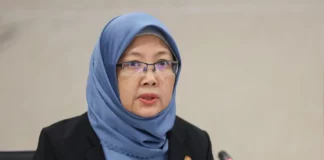PETALING JAYA,Mar 12: The latest clampdown on fake news comes as a shock for lawyers, with Bar Council president Salim Bashir describing the powers the government has given itself to clamp down on such news as “disturbing”.
Speaking to FMT, he also said the “imprecise definition” of fake news that includes anything related to Covid-19 and the proclamation of emergency, was “worrisome.”
Gazetted on Thursday, the Emergency (Essential Powers) (No. 2) Ordinance 2021 penalises those who create, publish or distribute fake news with a fine of up to RM100,000, a jail term of up to three years or both.
If they fail to apologise after being ordered to do so by the court, they can be fined an additional RM50,000, and those who pay to “create” such news can be fined up to RM500,000. All fines come with jail terms as well.
The law comes into force at midnight.
Salim said his immediate concern was that certain provisions of the law go against natural justice and fair trial.
He pointed out that Section 10 of the law means the Evidence Act does not apply, with Section 12 allowing statements made by an accused to be used against them in a court of law – in contrast to Section 112 of the Criminal Procedure Code.
“As an example, if you go to the police station and make a statement, that can be used against you as evidence. It does not provide any room for challenges,” he said.
“Meanwhile, Section 15, regarding admissibility of documentary evidence, means that if an authorised officer comes to your house and simply takes your documents to be used as evidence, you cannot question the manner in which they obtain it, and whether it was done illegally.
“Section 24 is disturbing too. It’s a replica of the MACC provision (Section 62 of the MACC Act), and its highly objectionable as it mandates the accused to put forward a statement of defence before trial.
“This might have an effect of depriving the accused of his right to put in his defence during trial, and not to disclose it anytime before trial starts, as any other ordinary trial.”
Salim also questioned Section 7 of the law, which allows the court to order for the removal of a publication containing “fake news” with an ex parte application.
Stating that the publisher and their lawyer should be alerted in such instances, Salim said this was necessary as the aggrieved parties need to be represented in court.
“The ex parte application provided under Section 7 cannot be used to deprive one of the right to be heard on such an application to remove the publication containing fake news,” he pointed out.
Meanwhile, lawyer Muhammad Rafique Rashid Ali said the new laws were worrying and has a “net effect” on freedom of expression.
Stating that they curtail the constitutionally-enshrined principle of freedom of expression, he questioned whether the law is a “move to silence the rakyat”.
“The new laws are a lopsided and highly dangerous piece of legislation which has the potential to be abused,” the Malaysian Bar Criminal Committee co-chair told FMT.
Rafique also said that the definition of “fake news” under the law was too wide.
Stressing that the law was “absolutely unnecessary”, Rafique noted there are sufficient laws in place to counter fake news such as the Communications and Multimedia Act 1998, Sedition Act 1948 and the Penal Code.



















